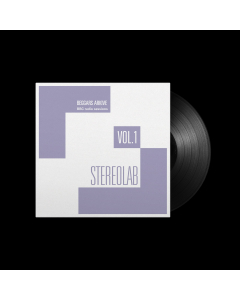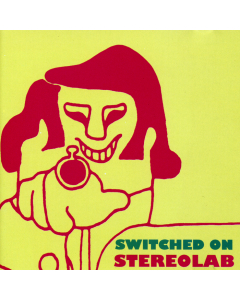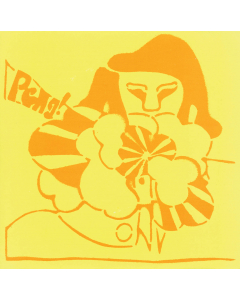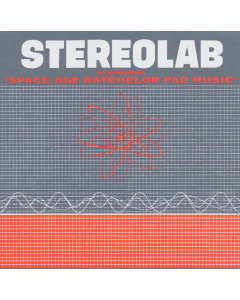Stereolab
In an admiring review of their most recent studio album, 2004's Margarine Eclipse, Spin Magazine hailed Stereolab as one of pop's 50 most influential ensembles. "No one can do beautiful, energising crossover pop like Stereolab,°± concurred The Independent, while a US writer, one Eric Greenwood, echoed the sentiments of thousands of "Lab devotees when describing the band's enduring appeal thus: "The formula has never been broken; it's only tweaked slightly with each new album, and I never want it to end.”
Indeed, over fifteen prolific years of qualitatively consistent output Stereolab have accrued a vast, peerless cache of work, hallmarked by a unique, carefully evolving but instantly recognizable sonic imprimatur. In addition to over a dozen glittering LPs, their back catalogue is littered with fan-pleasing gems: limited editions, one-off collaborations, split singles et al. In the process they've galvanised an extensive, staunchly loyal international fanbase; become a byword for playful, stylish excellence; struck a blow for the feminisation of rock and booked a permanent seat at experimental pop's high table.
Not bad for a group who eschew many of the established calling cards of rock careerism in favour of dedication to a singular, picturesque muse. To all intents and purposes, Stereolab continue to inhabit some hermetic parallel universe forever redolent with the innocent-yet-glamorous promise of space age futurism and timeless radical chic; their essential fluorescence blissfully unsullied by the dreary spreadsheet certainties of the modern music industry.
Theirs is a rich, overflowing palette, readily able to blur the gulf between Os Mutantes and the BBC Radiophonic Orchestra; merge Krzysztof Komeda with the Velvet Underground, Francoise Hardy with Neu! and Burt Bacharach with Esquivel. A deluxe blend, in other words, with ingredients plucked assiduously from pop's coolest outposts: 50's lounge, Rive Gauche chanson, Brazilian tropicalia, North American art rock, East European film music, Krautrock. hi-fi test recordings, mood music and more. Somehow they distil these apparently incongruent components into an ageless exotica that is all their own.
Their song titles alone are evocative exercises in arcane modernism: John Cage Bubblegum, Lo Boob Oscillator, Jaunty Monty And The Bubbles Of Silence, Motoroller Scalatron, Ticker-tape Of The Unconscious, Suggestion Diabolique and the like - designations that are evocative, smart, mischievous and, like the music they frame, somehow impossibly sophisticated yet beguilingly childlike. Ditto a litany of vivid, graphically alluring, naively modish record sleeves.
--------------
Stereolab owe their genesis to C86 generation indie janglers McCarthy, helmed by East London record obsessive Tim Gane. As McCarthy fizzled out at the turn of the "90s, so Gane began a relationship with French-born singer Laetitia Sadier, the latter contributing to McCarthy's final recordings. The pair quickly regrouped, launching Stereolab in 1991with Faith Healers' drummer Joe Dilworth, ex-Chills bassist Martin Kean and singer Gina Morris.
The band released a clutch of singles (sold by mail order, on tour, or through London's Rough Trade shop) which were corralled by Too Pure Records in 1992 and released as the LP Switched On. The wider world was thus introduced to Sadier's stately, impassive vocal style (Nico by way of Jane Birkin and Laurie Anderson) essaying incisive disquisitions on the ennui of consumer culture. Inspired by Mai '68 polity and French Situationist philosophy (rather than the oft-quoted "Marxism"), Sadier's voice wafting cerebral Gallic cool over the band's insistent dronescapes, instantly established one of modern pop's most distinctive sonic marques. Indeed, to many, Stereolab seemed to have arrived ready formed; the perfect retro-futurist art band with impeccable influences and polemical power to add.
Equally full-bodied debut-proper Peng! also hit the racks in "92 just as the band was evolving into a formidable live entity, welcoming Australian harmony vocalist/guitarist Mary Hansen and drummer Andy Ramsay as core "Lab technicians. Further limited edition singles and EPs ensued, helping cement a burgeoning cult following.
With an unquenchable appetite for touring, Stereolab were already eyeing the globe and, on the back of one such EP - The Groop Played Space Age Bachelor Pad Music EP - signed to Elektra/Warner Bros for worldwide releases in 1993. "The Groop' now featured bassist Duncan Brown and ex-Microdisney multi-instrumentalist Sean O'Hagan who helped graft an urbane, faux-"50s lounge quality onto the band's already trademark motorik chassis, broadening their appeal still further.
Duophonic Ultra High Frequency Discs would henceforth become the band's UK home imprint. (Stereolab’s own bespoke indie label, Duophonic Super 45s, had been initiated in 1991 as a conduit for their early singles. Duophonic would later release music by the likes of La Bradford, Tortoise, Broadcast and Gane and O'Hagan's sometime splinter group Turn On).
Transient Random-Noise Bursts With Announcements - their major label Elektra/Duophonic debut - followed in late 1994. It remains one of the band's best loved longplayers, with all eighteen minutes of the cyclic, luminescent Jenny Ondioline at its core. A significant college hit throughout North America, the album also consolidated flourishing European and Japanese fanbases. Stereolab's soon became the underground name to drop and the band capitalized with 1994's Mars Audiac Quintet. - a showcase for Sadier and Hansen's preternaturally intertwined vocal descants. Mars°¶ was another transatlantic indie hit, boasted a new keyboardist, Katherine Gifford, and prefaced a deviation from beat combo chug in the shape of 1995's Music For The Amorphous Body - an EP created for an interactive installation by artist Charles Long.
If nothing else, the EP confirmed Stereolab's enviable position: significant enough "alternative rock' sellers to make a healthy living which in turn allowed scope for lateral experimentation. In the case of Music For°¶ this meant a playground of intricate string arrangements and measured keyboard melodies that were more restrained than the band's established signature. Its limited edition run of 10,000 nonetheless sold out in a day and graced many a critics' end-of-year "best of" charts.
Stereolab's second volume of collected miscellanea, jauntily entitled Refried Ectoplasm (Switched On, Volume. 2), appeared later that year (on Duophonic in the UK and Drag City in the US) and crept into the mainstream UK Top 30 after the band toured successfully with Pulp. Around the same time Morgan Lohte replaced keyboardist Gifford and a bold new phase of Stereolab recording began.
Decamping to Chicago to work with Tortoise mainstay/producer John McEntire, the band added ultramodern jazz, Latin and funk nuances to their already esoteric template, along with the lush string arrangements of (now only occasional "Lab contributor and full time High Lama) Sean O'Hagan, creating a luxuriant, multi-textured sound.
The resulting Emperor Tomato Ketchup (named after a cult 1970 movie by Japanese director Shuji Terayama) - the band's fourth full length album in five years - was released in the spring of 1996 and proved to be their biggest critical success to date ("the most addictive music of the moment°± according to The Guardian). A copious cavalcade of delightful mood swings, it bristled with instant pop tunes like Cybele's Reverie punctuated by eerie Krautscapes like of Olv 26 and the cranked up combo swagger of Noise Of Carpet.
With Richard Harrison taking over from Duncan Brown on bass, the succeeding Dots And Loops, released in 1997, proved another fine collection, this time easing off on the avant-funk pedal in favour of lavish brass, a swinging bossa nova feel and carefully crafted arrangements. Mostly recorded in Chicago with John McEntire once more at the helm, part of the record was also cut in D_sseldorf with Andi Toma and Jan St Werner of maverick electronic duo Mouse On Mars. Mood music and '60s French pop influences were also more keenly felt here, with Sadier and Hansen's cooing vocal synergy once more in exclesis. As was the norm, the band toured extensively in support.
A comparative hiatus then followed, mainly to facilitate the birth of Gane and Sadier's first child. In the interim a third volume of rarity ephemera - Aluminum Tunes (Switched On, Vol. 3) was released, featuring holy grail-like tracks from the long deleted Amorphous Body Centre EP.
An unprecedented two year gap between studio albums (interrupted by a brace of anticipatory singles, including a one-off collaboration with French chanteuse Brigitte Fontaine) had fans feverishly anticipating September 1999's Cobra And Phases Group Play Voltage In The Milky Night (the first to feature new bass player Simon Johns). With a triumvirate of producers (John McEntire, Sean O'Hagan and Chicagoan enfant terrible, polymath and sometime Sonic Youth bassist Jim O'Rourke) the album was a essentially created by committee. While it didn't expand the Stereolab universe quite as much as the more demanding aficionados had hoped, it proved another undeniably opulent confection of gorgeous vocal timbres and shimmering, pointillist arrangements (O'Rourke's lovely strings in particular). A breathless 5-star review from Uncut and approving notices elsewhere reinforced the impression that Stereolab had now attained "beloved institution"' status.
Recorded in London at the turn of the Millennium, the mini-album The First Of The Microbe Hunters, ushered in 21st century Stereolab. Influenced by outer space-friendly classical composers Gustav Holst and Olivier Messiaen, the band's seventh full studio album, Sound-Dust, appeared in September 2001, preceded by a bewitching four track EP, Captain Easychord. Recorded mostly in Chicago with the "avant-Celts" - Messrs McEntire, O'Rourke and O'Hagan - once again at the helm, both collections were robust additions to the 'Lab canon.
2002 saw the release of a sprawling 32-track, double CD collection of BBC radio sessions and an album, Socialism Ou Barbarie, by Laetitia Sadier's side project, Monade and the end of Morgane Lhote's tenure in the band. The BBC collection provided an apt moment of stock-taking, spanning, as it did, a prolific decade of Stereolab history from July 1991 to August 2001.
Construction of a new recording nerve centre - christened Instant 0, located 30 Kilometres north of Bordeaux - was now in full swing and this ought to have marked a valuable period of battery-charging for Stereolab. Sadly, tragedy was to strike in December with the death of Mary Hansen in a London cycling accident.
After a justifiable period of grieving, the group chose to soldier on and honour their recording commitments. The new studio was completed and though Gane and Sadier's relationship was now at an end, Stereolab were in positive mood and set about recording fresh material with a renewed dynamism. Released in early 2004, the celebratory EP Instant 0 In The Universe was the first public proof of this. The album Margarine Eclipse followed in February, to a hail of critical hyperbole ("Stereolab continue to make space-dusted muzak that pleasures the cranium the way only synthetic-pulsed pop can°± remarked X-Ray magazine, typically) and generally warm "welcome back' vibes abounded. Most reviewers noted the poignant track Feel And Triple - an elegy to the much missed Hansen.
The album was proof positive of Stereolab's redoubtable staying power - something borne out later in the year when the band signed a new worldwide licensing deal for their Duophonic imprint with Too Pure/Beggars Banquet. Preceded by a timely reissue of the first Too Pure Switched On compilation in late February 2005 and another Monade album, A Few Steps More, in March, the other first fruits of this enticing new chapter in Stereolab's fourteen-year odyssey will be the spectacularly titled Oscillons From The Anti-Sun, a sumptuous, three-CD-plus-DVD box set. Compiling tracks -- previously only available as imports (with the exception of “Noise Of Carpet”) -- from the band's rare Duophonic EPs and singles as well as promo videos and TV appearances, this handsome rarities trove will be available in late April.
A brand new Stereolab album - Eric Greenwood and legions of other Stereo-philes around the globe will be elated to hear - is earmarked for 2006.
David Sheppard, February 2005
Indeed, over fifteen prolific years of qualitatively consistent output Stereolab have accrued a vast, peerless cache of work, hallmarked by a unique, carefully evolving but instantly recognizable sonic imprimatur. In addition to over a dozen glittering LPs, their back catalogue is littered with fan-pleasing gems: limited editions, one-off collaborations, split singles et al. In the process they've galvanised an extensive, staunchly loyal international fanbase; become a byword for playful, stylish excellence; struck a blow for the feminisation of rock and booked a permanent seat at experimental pop's high table.
Not bad for a group who eschew many of the established calling cards of rock careerism in favour of dedication to a singular, picturesque muse. To all intents and purposes, Stereolab continue to inhabit some hermetic parallel universe forever redolent with the innocent-yet-glamorous promise of space age futurism and timeless radical chic; their essential fluorescence blissfully unsullied by the dreary spreadsheet certainties of the modern music industry.
Theirs is a rich, overflowing palette, readily able to blur the gulf between Os Mutantes and the BBC Radiophonic Orchestra; merge Krzysztof Komeda with the Velvet Underground, Francoise Hardy with Neu! and Burt Bacharach with Esquivel. A deluxe blend, in other words, with ingredients plucked assiduously from pop's coolest outposts: 50's lounge, Rive Gauche chanson, Brazilian tropicalia, North American art rock, East European film music, Krautrock. hi-fi test recordings, mood music and more. Somehow they distil these apparently incongruent components into an ageless exotica that is all their own.
Their song titles alone are evocative exercises in arcane modernism: John Cage Bubblegum, Lo Boob Oscillator, Jaunty Monty And The Bubbles Of Silence, Motoroller Scalatron, Ticker-tape Of The Unconscious, Suggestion Diabolique and the like - designations that are evocative, smart, mischievous and, like the music they frame, somehow impossibly sophisticated yet beguilingly childlike. Ditto a litany of vivid, graphically alluring, naively modish record sleeves.
--------------
Stereolab owe their genesis to C86 generation indie janglers McCarthy, helmed by East London record obsessive Tim Gane. As McCarthy fizzled out at the turn of the "90s, so Gane began a relationship with French-born singer Laetitia Sadier, the latter contributing to McCarthy's final recordings. The pair quickly regrouped, launching Stereolab in 1991with Faith Healers' drummer Joe Dilworth, ex-Chills bassist Martin Kean and singer Gina Morris.
The band released a clutch of singles (sold by mail order, on tour, or through London's Rough Trade shop) which were corralled by Too Pure Records in 1992 and released as the LP Switched On. The wider world was thus introduced to Sadier's stately, impassive vocal style (Nico by way of Jane Birkin and Laurie Anderson) essaying incisive disquisitions on the ennui of consumer culture. Inspired by Mai '68 polity and French Situationist philosophy (rather than the oft-quoted "Marxism"), Sadier's voice wafting cerebral Gallic cool over the band's insistent dronescapes, instantly established one of modern pop's most distinctive sonic marques. Indeed, to many, Stereolab seemed to have arrived ready formed; the perfect retro-futurist art band with impeccable influences and polemical power to add.
Equally full-bodied debut-proper Peng! also hit the racks in "92 just as the band was evolving into a formidable live entity, welcoming Australian harmony vocalist/guitarist Mary Hansen and drummer Andy Ramsay as core "Lab technicians. Further limited edition singles and EPs ensued, helping cement a burgeoning cult following.
With an unquenchable appetite for touring, Stereolab were already eyeing the globe and, on the back of one such EP - The Groop Played Space Age Bachelor Pad Music EP - signed to Elektra/Warner Bros for worldwide releases in 1993. "The Groop' now featured bassist Duncan Brown and ex-Microdisney multi-instrumentalist Sean O'Hagan who helped graft an urbane, faux-"50s lounge quality onto the band's already trademark motorik chassis, broadening their appeal still further.
Duophonic Ultra High Frequency Discs would henceforth become the band's UK home imprint. (Stereolab’s own bespoke indie label, Duophonic Super 45s, had been initiated in 1991 as a conduit for their early singles. Duophonic would later release music by the likes of La Bradford, Tortoise, Broadcast and Gane and O'Hagan's sometime splinter group Turn On).
Transient Random-Noise Bursts With Announcements - their major label Elektra/Duophonic debut - followed in late 1994. It remains one of the band's best loved longplayers, with all eighteen minutes of the cyclic, luminescent Jenny Ondioline at its core. A significant college hit throughout North America, the album also consolidated flourishing European and Japanese fanbases. Stereolab's soon became the underground name to drop and the band capitalized with 1994's Mars Audiac Quintet. - a showcase for Sadier and Hansen's preternaturally intertwined vocal descants. Mars°¶ was another transatlantic indie hit, boasted a new keyboardist, Katherine Gifford, and prefaced a deviation from beat combo chug in the shape of 1995's Music For The Amorphous Body - an EP created for an interactive installation by artist Charles Long.
If nothing else, the EP confirmed Stereolab's enviable position: significant enough "alternative rock' sellers to make a healthy living which in turn allowed scope for lateral experimentation. In the case of Music For°¶ this meant a playground of intricate string arrangements and measured keyboard melodies that were more restrained than the band's established signature. Its limited edition run of 10,000 nonetheless sold out in a day and graced many a critics' end-of-year "best of" charts.
Stereolab's second volume of collected miscellanea, jauntily entitled Refried Ectoplasm (Switched On, Volume. 2), appeared later that year (on Duophonic in the UK and Drag City in the US) and crept into the mainstream UK Top 30 after the band toured successfully with Pulp. Around the same time Morgan Lohte replaced keyboardist Gifford and a bold new phase of Stereolab recording began.
Decamping to Chicago to work with Tortoise mainstay/producer John McEntire, the band added ultramodern jazz, Latin and funk nuances to their already esoteric template, along with the lush string arrangements of (now only occasional "Lab contributor and full time High Lama) Sean O'Hagan, creating a luxuriant, multi-textured sound.
The resulting Emperor Tomato Ketchup (named after a cult 1970 movie by Japanese director Shuji Terayama) - the band's fourth full length album in five years - was released in the spring of 1996 and proved to be their biggest critical success to date ("the most addictive music of the moment°± according to The Guardian). A copious cavalcade of delightful mood swings, it bristled with instant pop tunes like Cybele's Reverie punctuated by eerie Krautscapes like of Olv 26 and the cranked up combo swagger of Noise Of Carpet.
With Richard Harrison taking over from Duncan Brown on bass, the succeeding Dots And Loops, released in 1997, proved another fine collection, this time easing off on the avant-funk pedal in favour of lavish brass, a swinging bossa nova feel and carefully crafted arrangements. Mostly recorded in Chicago with John McEntire once more at the helm, part of the record was also cut in D_sseldorf with Andi Toma and Jan St Werner of maverick electronic duo Mouse On Mars. Mood music and '60s French pop influences were also more keenly felt here, with Sadier and Hansen's cooing vocal synergy once more in exclesis. As was the norm, the band toured extensively in support.
A comparative hiatus then followed, mainly to facilitate the birth of Gane and Sadier's first child. In the interim a third volume of rarity ephemera - Aluminum Tunes (Switched On, Vol. 3) was released, featuring holy grail-like tracks from the long deleted Amorphous Body Centre EP.
An unprecedented two year gap between studio albums (interrupted by a brace of anticipatory singles, including a one-off collaboration with French chanteuse Brigitte Fontaine) had fans feverishly anticipating September 1999's Cobra And Phases Group Play Voltage In The Milky Night (the first to feature new bass player Simon Johns). With a triumvirate of producers (John McEntire, Sean O'Hagan and Chicagoan enfant terrible, polymath and sometime Sonic Youth bassist Jim O'Rourke) the album was a essentially created by committee. While it didn't expand the Stereolab universe quite as much as the more demanding aficionados had hoped, it proved another undeniably opulent confection of gorgeous vocal timbres and shimmering, pointillist arrangements (O'Rourke's lovely strings in particular). A breathless 5-star review from Uncut and approving notices elsewhere reinforced the impression that Stereolab had now attained "beloved institution"' status.
Recorded in London at the turn of the Millennium, the mini-album The First Of The Microbe Hunters, ushered in 21st century Stereolab. Influenced by outer space-friendly classical composers Gustav Holst and Olivier Messiaen, the band's seventh full studio album, Sound-Dust, appeared in September 2001, preceded by a bewitching four track EP, Captain Easychord. Recorded mostly in Chicago with the "avant-Celts" - Messrs McEntire, O'Rourke and O'Hagan - once again at the helm, both collections were robust additions to the 'Lab canon.
2002 saw the release of a sprawling 32-track, double CD collection of BBC radio sessions and an album, Socialism Ou Barbarie, by Laetitia Sadier's side project, Monade and the end of Morgane Lhote's tenure in the band. The BBC collection provided an apt moment of stock-taking, spanning, as it did, a prolific decade of Stereolab history from July 1991 to August 2001.
Construction of a new recording nerve centre - christened Instant 0, located 30 Kilometres north of Bordeaux - was now in full swing and this ought to have marked a valuable period of battery-charging for Stereolab. Sadly, tragedy was to strike in December with the death of Mary Hansen in a London cycling accident.
After a justifiable period of grieving, the group chose to soldier on and honour their recording commitments. The new studio was completed and though Gane and Sadier's relationship was now at an end, Stereolab were in positive mood and set about recording fresh material with a renewed dynamism. Released in early 2004, the celebratory EP Instant 0 In The Universe was the first public proof of this. The album Margarine Eclipse followed in February, to a hail of critical hyperbole ("Stereolab continue to make space-dusted muzak that pleasures the cranium the way only synthetic-pulsed pop can°± remarked X-Ray magazine, typically) and generally warm "welcome back' vibes abounded. Most reviewers noted the poignant track Feel And Triple - an elegy to the much missed Hansen.
The album was proof positive of Stereolab's redoubtable staying power - something borne out later in the year when the band signed a new worldwide licensing deal for their Duophonic imprint with Too Pure/Beggars Banquet. Preceded by a timely reissue of the first Too Pure Switched On compilation in late February 2005 and another Monade album, A Few Steps More, in March, the other first fruits of this enticing new chapter in Stereolab's fourteen-year odyssey will be the spectacularly titled Oscillons From The Anti-Sun, a sumptuous, three-CD-plus-DVD box set. Compiling tracks -- previously only available as imports (with the exception of “Noise Of Carpet”) -- from the band's rare Duophonic EPs and singles as well as promo videos and TV appearances, this handsome rarities trove will be available in late April.
A brand new Stereolab album - Eric Greenwood and legions of other Stereo-philes around the globe will be elated to hear - is earmarked for 2006.
David Sheppard, February 2005




